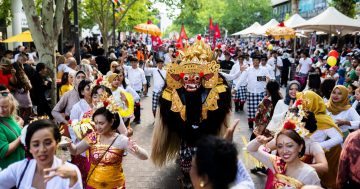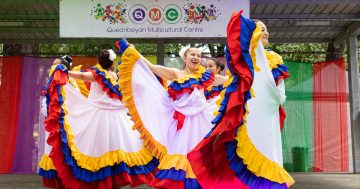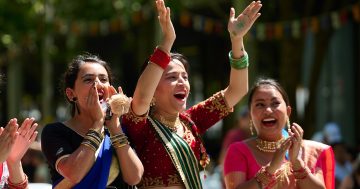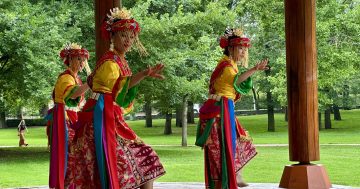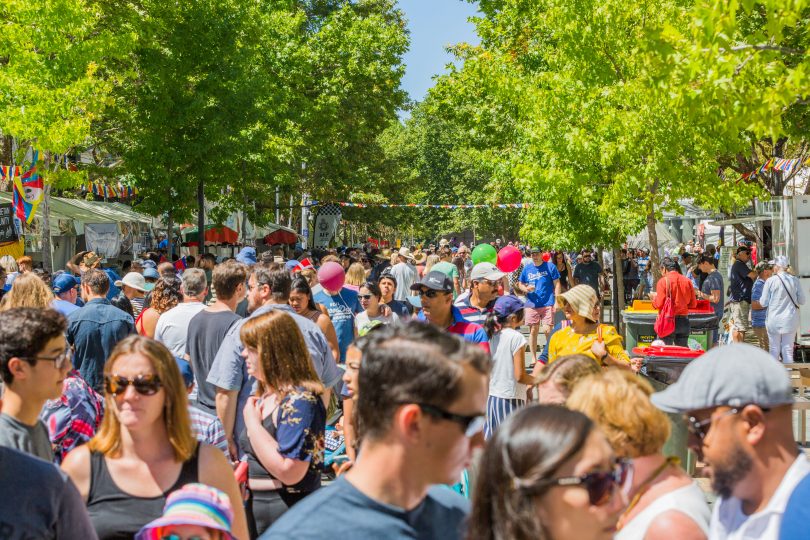
The 2018 Multicultural Festival. Community groups were banned from selling alcohol. Photo: Jack Mohr.
A cornered Minister for Multicultural Affairs Rachel Stephen-Smith has indicated she will review the decision to restrict liquor permits at this year’s National Multicultural Festival after being confronted with evidence that contradicts the official reasons given for stopping community groups selling alcohol.
In an excruciating interview on ABC Radio, Ms Stephen-Smith attempted to bluster her way through questions but was repeatedly pulled back to the main point that the decision actually contradicted advice from police, not the other way round as was initially stated by the Government.
The ABC, armed with documents obtained under Freedom of Information laws, reported that police had criticised East Row IGA as “flogging alcohol” at the 2017 Festival but it was still granted a liquor permit this year, while community groups were not.
Police told festival organisers they struggled to see the “cultural significance” of East Row IGA stallholders selling “cheap alcohol” in 2017, and warned the festival was becoming “too commercial”.
They expressed serious concerns about the level of intoxication at the event.
“In acknowledging the focus upon multicultural celebration, I believe that alcohol sales should form a component of this ethos,” one police official said in an email to organisers.
“Alcohol sales that fall within a multicultural context would not only limit the number of licences, but also support the multicultural theme.”
But instead of restricting the number of commercial permit-holders, organisers banned community groups obtaining liquor permits.
Overall liquor permits were cut by two-thirds at this year’s festival, from 65 to 21, but East Row IGA was again issued one.
The ABC said that in recommending community groups be refused liquor permits, a draft government report cited feedback from unnamed stakeholders that community groups posed a greater risk than commercial vendors.
“[This is] due to their enthusiasm to generate income through creative ideas to serve alcoholic drinks,” the report said.
In emails to the directorate, police did claim it was “unacceptable” that community groups were not required to hold responsible service of alcohol (RSA) training.
But they also reported they inspected every licence at the event and found “no real problems”, other than a few stallholders selling alcohol after 10 pm.
Police took three people into protective custody for intoxication at the 2017 event out of a crowd of 280,000.
Ms Stephen-Smith attempted to defend the decision and the organising team in the directorate, saying that by the time community opposition emerged it was too late to make a change.
Under pressure, the Minister said she had always been committed to reviewing the decision.
“The festival organising team made that decision around the participation policy, and I think they probably made that decision on the basis of addressing the primary concern, which was the serious concern about the level of intoxication in the area,” she said.
“Bearing in mind that it’s a small team running on a tight budget, they concluded that the best way to do that was to restrict alcohol licences to commercial providers.
“I backed that decision, I backed continuing with that policy in January, because at that point, it was very late in the process and all of the community groups had organised themselves on the basis of the participation policy.
“We’re perfectly happy to take on feedback for next year.”
Last week, Ms Stephen-Smith released the results of a community survey which found significantly more people felt safe at the festival — almost 80 per cent compared to 63.4 per cent the year before.
“The Festival’s reputation as a family-friendly event increased compared to last year, up from 64.6 per cent to 75.9 per cent, and nearly 80 per cent of people either agreed or strongly agreed that they felt safe at the Festival, an increase from 63.4 per cent last year,” she said.
The Canberra Liberals’ spokesperson on multicultural affairs, Elizabeth Kikkert, said the Minister’s omission of advice from ACT Policing has wronged Canberra’s ethnic community groups, and has tainted the ethos of the festival.
“The Minister rammed through a policy that defied ACT Policing’s clear advice for preserving the festival’s cultural significance and the safety of festival-goers,” she said.
“As the Canberra Liberals stated all along, this ban was wrong, and it should be lifted.”
The Minister should apologise to all community groups that were refused liquor permits, and also to the Canberra community who are rightly disappointed in their Multicultural Affairs Minister.”
Next year’s Festival will be held from Friday 15 to Sunday 17 February 2019.












